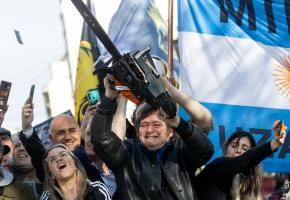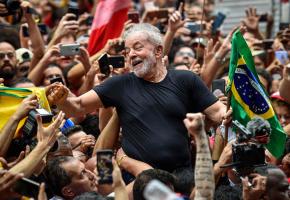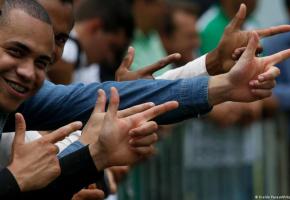
For As Long As It Takes
The story of the men who have been camped on Buenos Aires’ Plaza de Mayo for two and a half years
by Tom Gatehouse
Image

It is one of the first things one notices upon entering Buenos Aires’ historic Plaza de Mayo: just a few metres away from the Pirámide, the statue at the centre of the plaza, and from tourists posing for pictures with the Casa Rosada in the background, there is a makeshift camp. It is bordered on all sides by big sky-blue and white flags and banners, held up by sticks and bamboo canes. They bear motifs such as ‘MEMORIA, JUSTICIA, SIN OLVIDO’ (Memory, Justice, Never Forget) and ‘LAS MALVINAS FUERON, SON, Y SERÁN ARGENTINAS’ (The Falklands Were, Are, and Will Be Argentine).
This camp is maintained by some of the unrecognised veterans of the Malvinas War, men who have not been considered official combatants by successive governments, and who therefore do not qualify for the state pensions and benefits that have been granted to the recognised veterans. Until 1991 no war veteran received any kind of state pension or benefit, and many of them ended up on the street, begging for change. Those who returned from the war found themselves marginalized. After eight years of state terror under the last dictatorship, which culminated in a resounding military defeat, Argentina did not want to be reminded of its own failures.
Problems with Legal Recognition
The war veterans were even infiltrated and investigated by the Argentine police and intelligence services during the 1980s – under democratic governments. Documents show that they were considered ‘delinquent subversives’ for their demands of welfare benefits and healthcare plans. It wasn’t until 1990 that a pensions scheme was finally implemented. Fortunately, in recent years, the situation has improved significantly. Under the husband and wife team of Néstor Kirchner and Cristina Fernández de Kirchner, who have been in power in Argentina since 2003, the basic pensions offered to the Malvinas veterans have more than doubled. There are also now benefits and services available to those who suffered physical and psychological trauma during the war. However, formal recognition has still not been extended to all those involved.
At present, recognition is given to those who participated within what are known as TOM (Teatro de Operaciones Malvinas) and TOAS (Teatro de Operaciones del Atlántico Sur). These two jurisdictions cover the Malvinas Islands, the Georgia Islands, the South Sandwich Islands, the continental platform and the corresponding air and sea space. Crucially, this excludes those who participated in the conflict under the jurisdiction TOS (Teatro de Operaciones Sur) which refers to those men who were stationed at military bases along the Patagonian coastline. These are the men who are found in the camp at the Plaza de Mayo today.
No one – including the continental veterans - disputes that those soldiers stationed on the islands and on the sea suffered the most. Many of these young men were conscripts with little training or preparation for battle, with no hope against a professional army like the British. They also had to endure shocking cruelty on the part of their superiors. One example is the notorious estaqueos – “stakings” – in which soldiers were staked to the ground during wet weather for hours at a time, in temperatures below freezing. This punishment was usually given to those who stole food; the incompetence of the senior officers was such that many of the soldiers went hungry. Veterans have recounted tales of rapid weight loss, malnutrition and even starvation.
Like their British counterparts, the Argentine veterans of the Malvinas war suffer from unusually high suicide rates. Over 500 veterans are thought to have killed themselves since 1982, and the true number will be higher. Many more deaths will have been officially recorded as accidents, usually related to drug and alcohol abuse. This number probably surpasses the 649 soldiers who were killed in battle during the conflict. The majority of those who remain suffer from some form of post-traumatic stress disorder, and many have problems finding and maintaining a job.
While the men stationed on the coast did not have to endure such extreme hardships, they did have a role in the conflict. The Exocet missiles that sunk the British destroyer HMS Sheffield were launched from the naval base at Río Grande, Tierra del Fuego; and in May 1982, a British Sea King helicopter came down in Punto Arenas, Chile. The SAS men involved claimed they were forced to make an emergency landing as a result of bad weather and technical problems; however, a group of Argentine soldiers who were based at Río Gallegos claim the helicopter crashed as a result of being hit by their fire.
The Camp at the Plaza de Mayo
I went down to the Plaza de Mayo one afternoon and spent some time at the camp. I chatted with one Tulio Fraboschi, a man who was part of a logistic regiment based at a naval base in Comodoro Rivadavia, a port city in the Patagonian province of Chubut. He is adamant that the continental veterans will achieve the recognition they demand. ‘The camp will be here until the problem is resolved,’ he says. ‘Until they kick us out or until the problem is resolved.’ So which possibility does he think is more likely? ‘We will be successful because there will come a time when it is more convenient for the government to resolve the issue than to not.’
So what has the present government’s attitude been? He laughs and points to a dog that is trotting around the camp. He grabs it by the collar and shows me what is written on the tag – ‘Kristina,’ with the ‘K’ representing Kirchner. So the Kirchners have been sympathetic? ‘They tripled the pension for the recognised veterans,’ he says. ‘And the camp has been here in the Plaza de Mayo for more than two years because they understand that it is a just protest.’ I am confused: if the Kirchner government is on side, then why hasn’t the recognition already been extended to the continental veterans? ‘It is difficult deciding who exactly qualifies,’ he admits. ‘And even more difficult evaluating how much money is needed.’
While researching this article I came across a website that claims to represent the unrecognised veterans. In its mission statement it claims to struggle for ‘a law that includes us and protects us with scales for participation in the conflict.’ Tulio seems nettled when I ask him about this. ‘That’s not us,’ he says. ‘We want the recognition that exists presently. You are either a veteran or not; there is only one veteran and that is who is of the conflict. International law doesn’t allow for scales; it indicates that a veteran is someone who can potentially be attacked, not who is actually attacked.’ In other words, the pensions should exist for all those who participated, whatever their level of involvement.
He gives the example of the army chef; not someone who will be involved in fighting but still someone who fulfils an important role. So what exactly was the role of the men stationed in the Patagonian bases? ‘We lived in trenches, temporary accommodation facing the sea,’ he says. ‘It was a necessary obligation; we were there to protect the naval bases along the coast from the British fleet.’ So, if the British had mounted an attack on the mainland they would have had to fight. It is also the case that they could have been transferred to the islands or to the sea at any time.
Attitudes of others in Argentina
Tulio says when the camp was set up they had problems with the police and were attacked by a group of the recognised veterans. He gave me a short film to watch which shows violent clashes between the different groups of veterans on the Plaza de Mayo. ‘They came down to the square with knives,’ he says, pointing to a scar on his neck. Why is there not more solidarity between the different groups of veterans? ‘There is a small group of the recognised veterans, with economic interests,’ he says. ‘It is a mafia. They live on what they receive from the state.’ And so they feel threatened by other people trying to claim entitlement? He nods. ‘They think they will have less possibility of claiming in the future.’
I ask him about the attitude of Argentine society as a whole towards the camp. ‘Solidarity,’ he says, firmly. ‘We have a petition here with 150,000 signatures. We have the backing of the human rights groups, of Las Madres de la Plaza de Mayo, of the sexual equality campaigners, and of the Catholic church. We have [Jorge] Bergoglio’s [Archbishop of Buenos Aires] signature.’ So there is no antagonism from anyone, despite the visibility of the protest? ‘We never cut off a street,’ he says, referring to the piquetero movement of unemployed workers that frequently blocks streets in the capital. ‘We don’t want to inconvenience anyone.’
What about the attitude of the veterans towards the British? He shakes his head. ‘We pushed them and they responded. It was a lack of foresight by our government at the time, who thought the United States would support them.’ So there is no real anti-British sentiment? ‘They are our brothers,’ he says. ‘I have European blood.’ Like almost all Argentines, he thinks that Argentina has a claim to the islands, but that it is not worth going to war over. ‘War is stupid for any rational person,’ he says. ‘The issue of sovereignty should be resolved diplomatically.’
The Future?
Before I go, Tulio shows me around the camp. There is the main social area, where the veterans can usually be seen chatting, drinking mate, and smoking cigarettes. There is a small kitchen area with a gas stove, and also a bedroom divided by a partition from the rest of the camp. Inside, there is a single bed, with bundles of clothes and cushions strewn around. It is just as well the men have made themselves comfortable. Even if, as they believe, the government is sympathetic to their campaign, there will be many legal and bureaucratic difficulties involved in extending recognition, to what would be thousands more men. It may be the case that the unrecognised veterans of the Plaza de Mayo find themselves with more time to wait.
Whatever happens, the camp has immense symbolism. So much of Argentine political history has occurred in the Plaza de Mayo; Perón and Evita addressing the masses, the weekly vigils of the Madres de la Plaza de Mayo, and the riots in 2001 which forced the then president Fernando de la Rúa to leave the Casa Rosada by helicopter. It is the same square to which the then de facto president, Leopoldo Galtieri, announced the ‘recovery’ of the islands in 1982, declaring ‘If they [the British] want to come, then let them come!’ The Plaza de Mayo is the heart of Argentine political life, and the veterans camp is a very tangible reminder of some uncomfortable truths that just refuse to go away.














